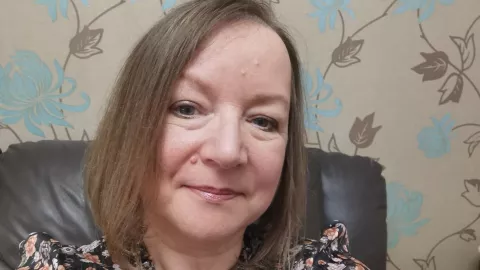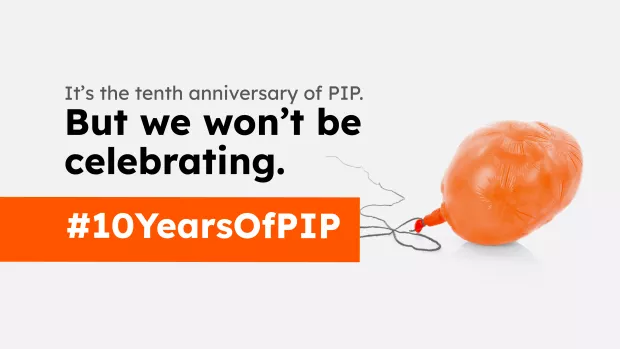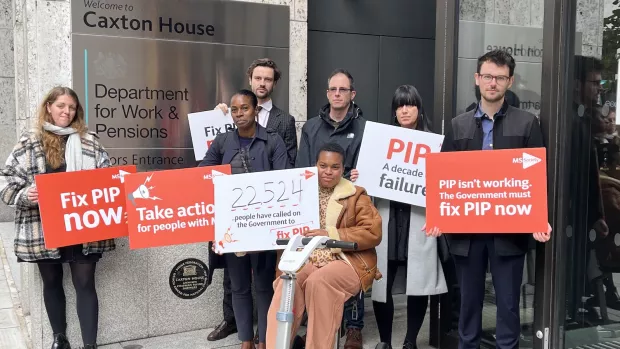
The informal observations in my PIP assessment didn’t depict my everyday life
My primary progressive MS affects my mental health and cognition the most.
I can hold a conversation but sometimes I struggle to get the words out. Or I can’t answer straight away. I also have issues with balance, nerve pain, fatigue, bladder and bowel problems.
I took ill health retirement in 2020. I can’t drive anymore either. I started going through red lights and stopping at green and getting lost. I have no hazard perception and can’t drive safely.
Applying for PIP
I first applied for Personal Independence Payment (PIP) before my MS diagnosis, when I thought my problems were down to mental health.
Filling in the application the first time wasn’t so bad. I worked in the civil service back then and I had experience of filling forms in. I was just awarded the basic level of the daily living component. But that seemed fine for what I was experiencing at the time.
I was off PIP for a while, then I applied again in 2015 when an MS nurse suggested it. By that point I was having problems with things like co-ordination and doing up buttons. I also had bad fatigue and problems with memory.
PIP helps me pay for things like taxis now I don’t drive. I sometimes forget where I am, so relying on buses is difficult. It’s also helped me pay for handrails on the stairs and adaptions to my husband’s car, to help me get in and out. Sometimes I need to hire a wheelchair or an electric scooter if we’re somewhere that involves a lot of walking. There are just a lot of aids and things I didn’t need to buy before, which now make my life a bit easier.
My second PIP assessment
The assessment in 2015 was a phone consultation. They reported as a measure of my mental health that I “attended the phone consultation on my own”. My husband was in the room, but I didn’t know he could join the meeting.
Almost all of the medical information I had given was overruled by the informal observations on the phone call. It said I demonstrated good memory and provided complex answers. But I had notes in front of me, and I can use long term memory – the assessment did not depict my everyday life.
I can’t remember what I had for breakfast today. I saw a film a few days ago, and I don’t remember a thing about it. I lose whole chunks of days and don’t get them back. They said I had a cat and could feed her. But I was not asked about the cat during the assessment, and so I didn’t say I have difficulty feeding her.
I can’t remember the whole process I had to go through. But eventually, I got PIP – the enhanced rate for daily living and standard rate for mobility.
My MS isn’t going to improve – but I had to reapply again
I had to re-apply in 2019. I took a lot of care filling all the forms in. My MS nurse wrote a letter to explain that my MS wasn’t going to improve. Even if I was on a treatment like ocrelizumab (Ocrevus), it would only slow progression down at best.
I had the very best written evidence from a neuro-psychologist, my MS nurse and my GP. They explained that my condition is progressive and described my cognitive and memory issues. It couldn’t have been any clearer. And yet still I was only awarded PIP for three years, and I was downgraded to a lower award.
During my 2019 telephone assessment, I was in tears
My cognitive issues mean that I struggle to understand distance. So when they kept asking how far I could walk, it was very hard to answer. I told them I could walk between 20 to 50 metres on a good day, but I’d need to sit down and have breaks along the way. That wasn’t good enough, she wouldn’t let it go. I had to describe in detail the route to the bus stop.
The other difficult question was about cooking a meal. They asked me how long it takes me to peel potatoes – I didn’t have a clue! I buy chopped veg or get my husband to help, so I hadn’t peeled a potato in about 10 years! She just wouldn’t accept that and said “we need an answer”. I tried to guess how long it would take me, but there are so many variables. Like whether I was tired or having a bad day. In the end I settled on 40 minutes. This was then classed as an acceptable time to prepare a meal.The whole session was about these two issues.
Some of the questions I’d answered in exactly the same way as I had in 2015, yet I got marked lower! It seems like it depends on the person judging you, and if they know anything about the condition.
Appealing the decision
At the time, I knew I was leaving work. I really needed the PIP money. It was very stressful. I needed it just to manage my life. For example, I can have bad bladder control and I have to buy lots of pads. They’re not cheap and much better than the NHS ones for my issues.
I had to appeal the decision, and I’ve been given an ongoing award at the higher rate now. So I won’t be contacted for 10 years. It’s a massive relief.
What needs to change?
I have a progressive condition. I have really good medical evidence showing that’s the case. So why did I have to prove that every year or two years?
One of the hard things about MS is that I can be doing really well for a few days, then the next I can be really struggling. Some days I can walk 20 metres, some days I can’t get out of bed. I don’t know what I’m going to wake up to. This week I’ve not been able to leave the house.
Symptoms can change day-to-day or even throughout the day. It depends on so many factors. And it feels impossible to answer the PIP questions specifically. There’s no way they can just see me for half an hour and fully understand my day-to-day needs.
Assessors should be medically trained and understand your condition.
Keep up to date on our campaigns
When we speak up together, we're stronger. Stay in touch about campaigns on disability benefits and all our others.




